关于时代发展与管理及管理学的科学性中英文翻译
管理学英文作文模板

管理学英文作文模板Management Studies English Essay Template。
Introduction。
Management studies is a field that encompasses various aspects of business and organizational management. It involves the study of leadership, decision-making, human resources, operations, and strategic planning. In this essay, we will explore the key concepts and principles of management studies, and their application in real-world business scenarios.Key Concepts of Management Studies。
1. Leadership: Leadership is a crucial aspect of management studies, as it involves the ability to guide and motivate a team towards achieving common goals. Effective leaders possess strong communication skills, vision, and the ability to inspire and empower their team members.2. Decision-making: Decision-making is a fundamental aspect of management, as managers are often required to make critical decisions that impact the organization's success. This involves evaluating options, considering potential outcomes, and choosing the best course of action.3. Human Resources: Managing human resources involves the recruitment, training, and development of employees within an organization. This includes creating a positive work environment, fostering employee engagement, and addressing any issues or conflicts that may arise.4. Operations: Operations management involves the planning, organizing, and controlling of processes and resources within an organization. This includes optimizing production, managing supply chains, and ensuring efficiency in day-to-day operations.5. Strategic Planning: Strategic planning involves setting long-term goals and objectives for an organization, and developing plans to achieve them. This includes analyzing market trends, identifying opportunities and threats, and developing strategies to stay competitive in the market.Application of Management Studies in Real-world Scenarios。
学术英语(管理)课文翻译
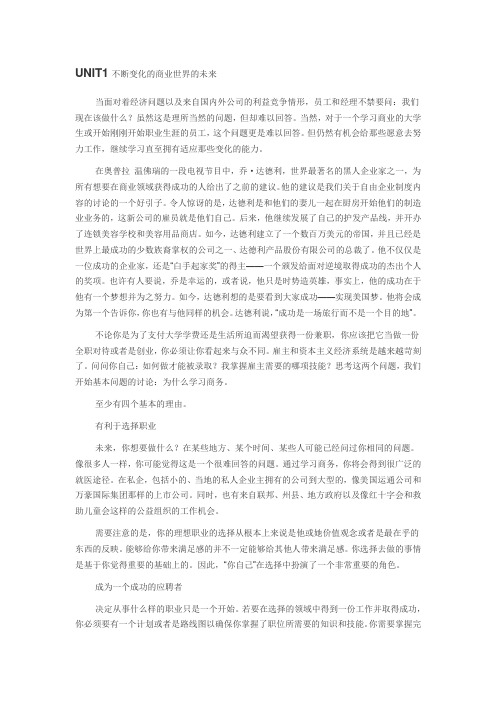
UNIT1不断变化的商业世界的未来当面对着经济问题以及来自国内外公司的利益竞争情形,员工和经理不禁要问:我们现在该做什么?虽然这是理所当然的问题,但却难以回答。
当然,对于一个学习商业的大学生或开始刚刚开始职业生涯的员工,这个问题更是难以回答。
但仍然有机会给那些愿意去努力工作,继续学习直至拥有适应那些变化的能力。
在奥普拉温佛瑞的一段电视节目中,乔·达德利,世界最著名的黑人企业家之一,为所有想要在商业领域获得成功的人给出了之前的建议。
他的建议是我们关于自由企业制度内容的讨论的一个好引子。
令人惊讶的是,达德利是和他们的妻儿一起在厨房开始他们的制造业业务的,这新公司的雇员就是他们自己。
后来,他继续发展了自己的护发产品线,并开办了连锁美容学校和美容用品商店。
如今,达德利建立了一个数百万美元的帝国,并且已经是世界上最成功的少数族裔掌权的公司之一、达德利产品股份有限公司的总裁了。
他不仅仅是一位成功的企业家,还是“白手起家奖”的得主——一个颁发给面对逆境取得成功的杰出个人的奖项。
也许有人要说,乔是幸运的,或者说,他只是时势造英雄,事实上,他的成功在于他有一个梦想并为之努力。
如今,达德利想的是要看到大家成功——实现美国梦。
他将会成为第一个告诉你,你也有与他同样的机会。
达德利说,“成功是一场旅行而不是一个目的地”。
不论你是为了支付大学学费还是生活所迫而渴望获得一份兼职,你应该把它当做一份全职对待或者是创业,你必须让你看起来与众不同。
雇主和资本主义经济系统是越来越苛刻了。
问问你自己:如何做才能被录取?我掌握雇主需要的哪项技能?思考这两个问题,我们开始基本问题的讨论:为什么学习商务。
至少有四个基本的理由。
有利于选择职业未来,你想要做什么?在某些地方、某个时间、某些人可能已经问过你相同的问题。
像很多人一样,你可能觉得这是一个很难回答的问题。
通过学习商务,你将会得到很广泛的就医途径。
在私企,包括小的、当地的私人企业主拥有的公司到大型的,像美国运通公司和万豪国际集团那样的上市公司。
科学发展观英文版

科学发展观英文版Thoroughly Applying the Scientific Outlook on DevelopmentTo continue to build a moderately prosperous society in all respects and develop socialism with Chinese characteristics at the new stage of development, we must follow the guidance of Deng Xiaoping Theory and the important thought of Three Represents and thoroughly apply the Scientific Outlook on Development.The Scientific Outlook on Development is a continuation and development of the important thoughts on development advanced by the previous three generations of central collective leadership of the CPC and a concentrated expression of the Marxist world outlook and methodology with regard to development. It is a scientific theory that is in the same line as Marxism-Leninism, Mao Zedong Thought, Deng Xiaoping Theory and the important thought of Three Represents and keeps up with the times. It is an important guiding principle for China's economic and social development and a major strategic thought that we must uphold and apply in developing socialism with Chinese characteristics.In light of the basic reality that China is in the primary stage of socialism, the Scientific Outlook on Development has been formulated to meet new requirements of development by analyzing China's own practice and drawing on the experience of other countries in development. At this new stage in the new century, China's development shows a series of new features which are mainly as follows: The economic strength has increased markedly, but the overall productivity remains low, the capacity for independent innovation is weak, and the longstanding structural problems and the extensive mode of growth are yet to be fundamentally addressed. The socialist market economy is basically in place, but there remain structural and institutional obstacles slowing down development,and further reform in difficult areas is confronted with deep-seated problems. A relatively comfortable standard of living has been achieved for the people as a whole, but the trend of a growing gap in income distribution has not been thoroughly reversed, there are still a considerable number of impoverished and low-income people in both urban and rural areas, and it has become more difficult to accommodate the interests of all sides. Efforts to balance development have yielded remarkable results, but the foundation of agriculture remains weak, the rural areas still lag behind in development, and we face an arduous task to narrow the urban-rural and interregional gaps in development and promote balanced economic and social development. Socialist democracy has continued to develop and we have made steady progress in implementing the rule of law as a fundamental principle, but efforts to improve democracy and the legal system fall somewhat short of the need to expand people's democracy and promote economic and social development, and political restructuring has to be deepened. Socialist culture is thriving as never before, but the people have growing cultural needs and have become more independent, selective, changeable and diverse in thinking, setting higher requirements for the development of an advanced socialist culture. Our society has become evidently more dynamic, but profound changes have taken place in the structure of society, in the way society is organized and in the pattern of social interests, and many new issues have emerged in social development and management. China is opening wider to the outside world, but international competition is becoming increasingly acute, pressure in the form of the economic and scientific dominance of developed countries will continue for a long time to come, both predictable and unpredictable risks are increasing, and the need to balance domestic development and opening to the outside world is greater than ever.All this shows that through the unremitting efforts we have made since the founding of the People's Republic in 1949, particularly since the introduction of the reform and opening up policy, Chinahas scored achievements in development that have captured world attention, and experienced far-reaching changes in the productive forces and the relations of production, as well as in the economic base and the superstructure. However, the basic reality that China is still in the primary stage of socialism and will remain so for a long time to come has not changed, nor has Chinese society's principal contradiction - the one between the ever-growing material and cultural needs of the people and the low level of social production. The current features of development in China are a concrete manifestation of that basic reality at this new stage in the new century. Stressing recognition of the basic reality is not meant to belittle ourselves, wallow in backwardness, or encourage unrealistic pursuit of quick results. Rather, such recognition will serve as the basis of our endeavor to advance reform and plan for development. We must always remain sober-minded, base our efforts on the most significant reality that China is in the primary stage of socialism, scientifically analyze the new opportunities and challenges arising from China's full involvement in economic globalization, fully understand the new situation and tasks in China's advance toward an industrialized, information-based, urbanized, market-oriented and internationalized country, have a good grasp of the new issues and problems we face in development, follow more conscientiously the path of scientific development, and strive to open up a broader vista for developing socialism with Chinese characteristics.The Scientific Outlook on Development takes development as its essence, putting people first as its core, comprehensive, balanced and sustainable development as its basic requirement, and overall consideration as its fundamental approach.- We must regard development as the top priority of the Party in governing and rejuvenating the country. Development is of decisive significance for building a moderately prosperous society in all respects and speeding up socialist modernization. We must firmly commit ourselves to the central task of economic development,concentrate on construction and development, and keep releasing and developing the productive forces. We must better implement the strategy of rejuvenating the country through science and education, the strategy of strengthening the nation with trained personnel and the strategy of sustainable development. We must grasp the law of development, make innovations in our thinking, transform the mode of development, crack hard issues and raise quality and efficiency to achieve sound and rapid development, so that we can lay a solid foundation for developing socialism with Chinese characteristics. We must strive for scientific development by putting people first and making it comprehensive, balanced and sustainable; we must strive for harmonious development by integrating all undertakings and promoting unity and amity among all members of society; and we must strive for peaceful development in the course of which China develops itself by safeguarding world peace and contributes to world peace by developing itself.- We must always put people first. Serving the people wholeheartedly is the fundamental purpose of the Party, and its every endeavor is for the well-being of the people. We must always make sure that the aim and outcome of all the work of the Party and the state is to realize, safeguard and expand the fundamental interests of the overwhelming majority of the people. We must respect the principal position of the people in the country's political life, give play to their creativity, protect their rights and interests, take the path of prosperity for all and promote their all-round development, to ensure that development is for the people, by the people and with the people sharing in its fruits.- We must pursue comprehensive, balanced and sustainable development. In accordance with the overall arrangements for the cause of socialism with Chinese characteristics, we will promote all-round economic, political, cultural and social development, coordinate all links and aspects of our modernization drive, and balance the relations of production with the productive forces and the superstructure with the economic base. We must adopt anenlightened approach to development that results in expanded production, a better life and sound ecological and environmental conditions, and build a resource-conserving andenvironment-friendly society that coordinates growth rate with the economic structure, quality and efficiency, and harmonizes economic growth with the population, resources and the environment, so that our people will live and work under sound ecological and environmental conditions and our economy and society will develop in a sustainable way.- We must persist in overall consideration. We need to correctly understand and handle the major relationships in the cause of socialism with Chinese characteristics and balance urban and rural development, development among regions, economic and social development, relations between man and nature, and domestic development and opening to the outside world. We must take into overall consideration the relationships between the central and local authorities, between personal and collective interests, between interests of the part and those of the whole, and between immediate and long-term interests, so as to fully arouse the initiative of all sides. We must take both the domestic and international situations into consideration, develop a global and strategic perspective, be good at seizing opportunities for development and coping with risks and challenges in a changing world, and work for a favorable international environment. While planning our work from an overall perspective, we need to work hard to make breakthroughs on the key issues that affect the overall situation and on the major problems that affect public interests.To thoroughly apply the Scientific Outlook on Development, we must always adhere to the Party's basic line of taking economic development as the central task and upholding the Four Cardinal Principles and the reform and opening up policy, known as " one central task and two basic points." As the lifeblood of the Party and the country, this basic line provides the political guarantee for scientific development. Taking economic development as thecentral task is vital to invigorating our nation and is the fundamental requirement for the robust growth and lasting stability of the Party and the nation. The Four Cardinal Principles are the very foundation for building our country and the political cornerstone for the survival and development of the Party and the nation. Reform and opening up are the path to a stronger China and the source of vitality for the Party and the nation in development and progress. We will continue to apply the line of " one central task and two basic points" in its entirety in our great endeavor to develop socialism with Chinese characteristics; we will never deviate from this line.To thoroughly apply the Scientific Outlook on Development, we must work energetically to build a harmonious socialist society. Social harmony is an essential attribute of socialism with Chinese characteristics. Scientific development and social harmony are integral to each other and neither is possible without the other. Building a harmonious socialist society is a historical mission throughout the cause of socialism with Chinese characteristics, as well as a historical process and the social outcome of correctly handling various social problems on the basis of development. It is through development that we will increase the material wealth of society and constantly improve people's lives, and it is again through development that we will guarantee social equity and justice and constantly promote social harmony. To realize social equity and justice is the Chinese Communists' consistent position and a major task of developing socialism with Chinese characteristics. In accordance with the general requirements for democracy and the rule of law, equity and justice, honesty and fraternity, vigor and vitality, stability and order, and harmony between man and nature and the principle of all the people building and sharing a harmonious socialist society, we will spare no effort to solve the most specific problems of the utmost and immediate concern to the people and strive to create a situation in which all people do their best, find their proper places in society and live together in harmony, so as toprovide a favorable social environment for development.To thoroughly apply the Scientific Outlook on Development, we must continue to deepen reform and opening up. We need to incorporate the spirit of reform and innovation into all links of governance, unswervingly adhere to the orientation of reform, and have more scientific decision-making and better coordinated measures for reform. We will improve the socialist market economy, promote institutional reform and innovation in various sectors, accelerate reform in important fields and crucial links, improve opening up in all respects and make our systems and mechanisms full of vigor, highly efficient, more open and conducive to scientific development, so as to provide a powerful driving force and an institutional guarantee for developing socialism with Chinese characteristics. We will always take improving people's lives as a pivotal task in balancing reform, development and stability and ensure that our reform always has the endorsement and support of the people.To thoroughly apply the Scientific Outlook on Development, we must strengthen our efforts to build the Party in earnest. As is required by the Party's lofty mission of governing and rejuvenating the nation, our efforts to improve the Party's governance capability and maintain and develop its vanguard nature must serve our task of directing scientific development, promoting social harmony, guiding development and progress in China and better representing and realizing the fundamental interests of the overwhelming majority of the people. In this way, the Party's work and our efforts to build the Party will better meet the requirement of the Scientific Outlook on Development and provide a reliable political and organizational guarantee for scientific development.All Party members must fully understand the content and grasp the essence of the Scientific Outlook on Development, be more conscious and determined in applying it, change notions that are not in line with it, work hard to solve major problems that affect or constrain scientific development, direct the whole society'senthusiasm for development to scientific development, and apply this outlook to every aspect of economic and social development.。
科学管理英文演讲稿范文
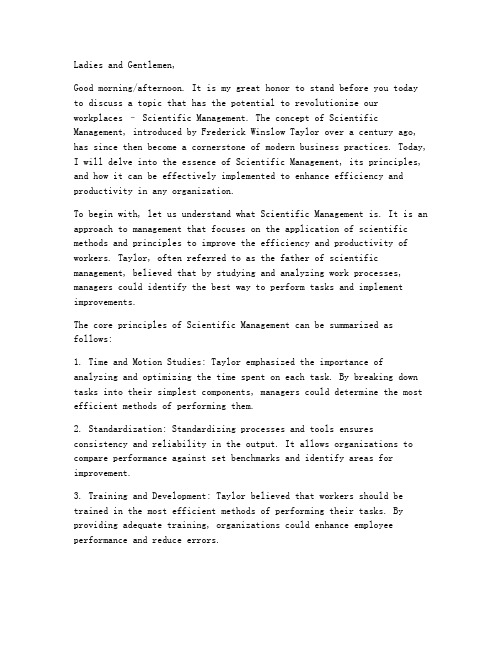
Ladies and Gentlemen,Good morning/afternoon. It is my great honor to stand before you today to discuss a topic that has the potential to revolutionize our workplaces – Scientific Management. The concept of Scientific Management, introduced by Frederick Winslow Taylor over a century ago, has since then become a cornerstone of modern business practices. Today, I will delve into the essence of Scientific Management, its principles, and how it can be effectively implemented to enhance efficiency and productivity in any organization.To begin with, let us understand what Scientific Management is. It is an approach to management that focuses on the application of scientific methods and principles to improve the efficiency and productivity of workers. Taylor, often referred to as the father of scientific management, believed that by studying and analyzing work processes, managers could identify the best way to perform tasks and implement improvements.The core principles of Scientific Management can be summarized as follows:1. Time and Motion Studies: Taylor emphasized the importance of analyzing and optimizing the time spent on each task. By breaking down tasks into their simplest components, managers could determine the most efficient methods of performing them.2. Standardization: Standardizing processes and tools ensures consistency and reliability in the output. It allows organizations to compare performance against set benchmarks and identify areas for improvement.3. Training and Development: Taylor believed that workers should be trained in the most efficient methods of performing their tasks. By providing adequate training, organizations could enhance employee performance and reduce errors.4. Division of Labor: Breaking down complex tasks into smaller, specialized tasks allows workers to become highly skilled in specific areas, thereby increasing overall productivity.5. Incentive Systems: Implementing incentive programs, such as piece-rate pay, can motivate workers to achieve higher levels of performance.Now, let us explore how Scientific Management can be effectively implemented in today's workplaces:1. Analyze Work Processes: Conduct thorough time and motion studies to identify inefficiencies and bottlenecks in work processes. Use this data to design optimized workflows.2. Invest in Technology: Leverage modern technology to streamline operations and enhance communication. Automation can reduce manual labor and improve accuracy.3. Empower Employees: Involve employees in the process of identifying and implementing improvements. This not only fosters a sense of ownership but also taps into the collective wisdom of the workforce.4. Develop a Culture of Continuous Improvement: Encourage a culture where employees are motivated to seek out and implement improvements. This can be achieved through regular training sessions, brainstorming sessions, and incentives.5. Monitor and Measure Performance: Regularly track performance against set benchmarks and use the data to make informed decisions. This ensures that the organization remains on the path to continuous improvement.In conclusion, Scientific Management offers a proven framework for enhancing efficiency and productivity in organizations. By embracing its principles and implementing them effectively, businesses can achieve higher levels of performance and gain a competitive edge in the market.Thank you for your attention. I welcome any questions or thoughts you may have regarding the power of Scientific Management. Let us strive to create workplaces that not only thrive but also inspire.。
科学管理 英语
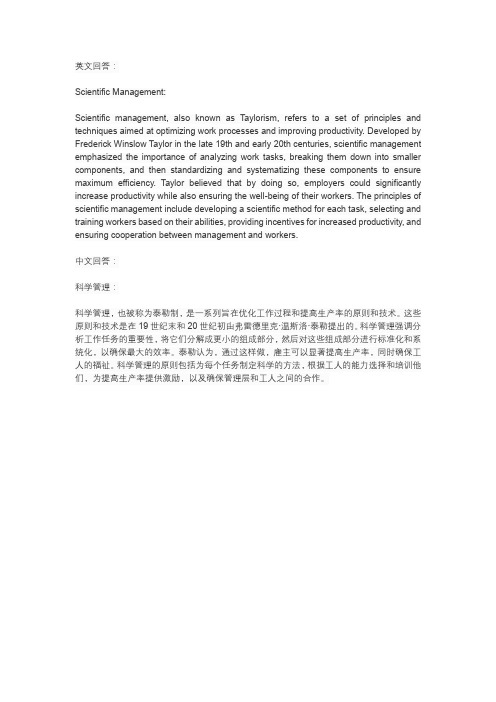
英文回答:Scientific Management:Scientific management, also known as Taylorism, refers to a set of principles and techniques aimed at optimizing work processes and improving productivity. Developed by Frederick Winslow Taylor in the late 19th and early 20th centuries, scientific management emphasized the importance of analyzing work tasks, breaking them down into smaller components, and then standardizing and systematizing these components to ensure maximum efficiency. Taylor believed that by doing so, employers could significantly increase productivity while also ensuring the well-being of their workers. The principles of scientific management include developing a scientific method for each task, selecting and training workers based on their abilities, providing incentives for increased productivity, and ensuring cooperation between management and workers.中文回答:科学管理:科学管理,也被称为泰勒制,是一系列旨在优化工作过程和提高生产率的原则和技术。
科学发展观
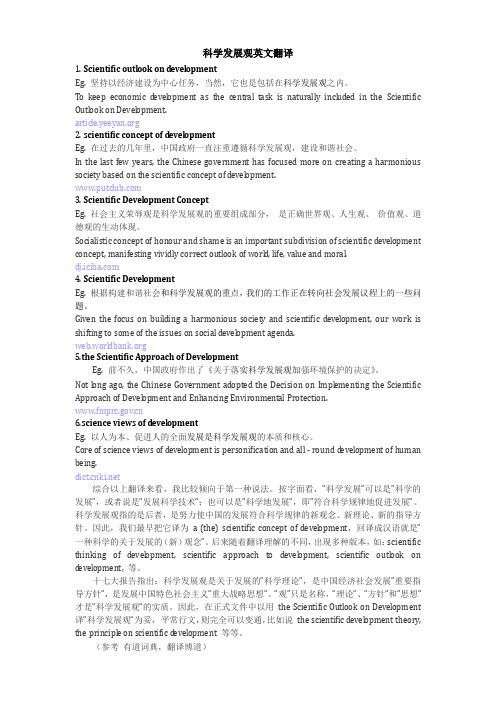
科学发展观英文翻译1. Scientific outl ook on d evel opmentEg. 坚持以经济建设为中心任务,当然,它也是包括在科学发展观之内。
To keep economic d evelopment as the central task is naturally includ ed in the Scientific Outl ook on Development.2. scientific concept of d evel opmentEg. 在过去的几年里,中国政府一直注重遵循科学发展观,建设和谐社会。
In the last few years, the Chinese government has focused more on creating a harmonious society based on the scientific concept of devel opment.3. Scientific Development ConceptEg. 社会主义荣辱观是科学发展观的重要组成部分,是正确世界观、人生观、价值观、道德观的生动体现。
Socialistic concept of honour and shame is an important subdivision of scientific development concept, manifesting vividly correct outl ook of world, life, value and moral.4. Scientific DevelopmentEg. 根据构建和谐社会和科学发展观的重点,我们的工作正在转向社会发展议程上的一些问题。
Given the focus on building a harmonious society and scientific devel opment, our work is shifting to some of the issues on social devel opment agenda.web.worl 5.the Scientific Approach of DevelopmentEg. 前不久,中国政府作出了《关于落实科学发展观加强环境保护的决定》。
科学管理原理英文

科学管理原理英文Scientific Management PrinciplesScientific management, also known as Taylorism, is a management theory that aims to improve efficiency and productivity in organizations. Developed by Frederick Winslow Taylor in the early 20th century, it focuses on the systematic study of work processes and the use of scientific methods to identify the most efficient way to perform tasks. This article discusses the principles of scientific management and their application in the modern business environment.1. Principle of Work StudyThe principle of work study involves analyzing and breaking down tasks into their basic elements to determine the most efficient way to perform them. This involves conducting time and motion studies to identify unnecessary movements, eliminate waste, and optimize work processes. By eliminating unnecessary tasks and standardizing work methods, organizations can reduce costs, improve productivity, and enhance employee satisfaction.2. Principle of Scientific Selection and TrainingScientific management emphasizes the importance of selecting the right people for the right job and providing them with the necessary training and development. This principle involves identifying the skills, knowledge, and abilities required for each job, and then systematically recruiting and selecting individuals who possess these qualities. Additionally, organizationsshould provide adequate training to ensure that employees have the necessary skills to perform their tasks effectively and efficiently.3. Principle of StandardizationThe principle of standardization involves developing and implementing standardized procedures and methods for performing tasks. By establishing standard operating procedures, organizations can ensure consistency, minimize errors, and improve efficiency. Standardization also facilitates the training of new employees, as they can easily learn and follow established procedures.4. Principle of Division of LaborThe principle of division of labor is based on the idea that breaking down complex tasks into smaller, specialized tasks can improve efficiency and productivity. By assigning specific tasks to individuals who specialize in those areas, organizations can take advantage of their expertise and reduce the time required to complete tasks. This leads to increased efficiency and improved overall performance.5. Principle of Incentives and RewardsScientific management recognizes the importance of providing incentives and rewards to motivate employees and enhance their performance. Taylor advocated for the use of financial incentives, such as piece-rate systems, to reward employees for their productivity. This principle encourages employees to work harder and more efficiently, as they are directly rewarded for their efforts.6. Principle of Functional ForemanshipThe principle of functional foremanship involves separating the planning and execution functions of management. Under this system, each worker is accountable to two supervisors - one responsible for planning and another for execution. This allows for greater specialization and expertise in each area, leading to improved coordination and efficiency.7. Principle of Cooperation between Management and EmployeesScientific management emphasizes the importance of cooperation and collaboration between management and employees. Taylor believed that effective management involved fostering a harmonious working relationship between employers and employees, based on mutual trust and respect. This principle aims to create a positive work environment that enhances employee satisfaction and productivity.In conclusion, scientific management principles provide a framework for maximizing efficiency and productivity in organizations. By applying these principles, businesses can streamline work processes, improve employee performance, and achieve better results. While scientific management has received criticism for its mechanistic approach, many of its principles continue to be relevant and influential in modern management practices.。
科学发展观 the Outlook of Scientific Development 等最新词汇翻译
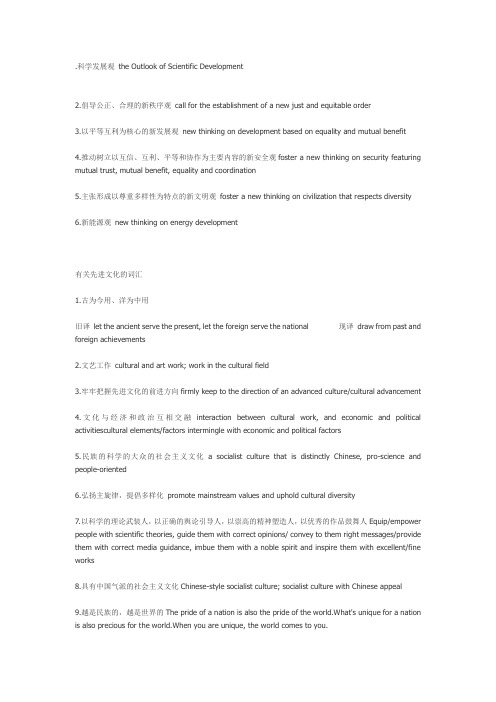
.科学发展观the Outlook of Scientific Development2.倡导公正、合理的新秩序观call for the establishment of a new just and equitable order3.以平等互利为核心的新发展观new thinking on development based on equality and mutual benefit4.推动树立以互信、互利、平等和协作为主要内容的新安全观foster a new thinking on security featuring mutual trust, mutual benefit, equality and coordination5.主张形成以尊重多样性为特点的新文明观foster a new thinking on civilization that respects diversity6.新能源观new thinking on energy development有关先进文化的词汇1.古为今用、洋为中用旧译let the ancient serve the present, let the foreign serve the national 现译draw from past and foreign achievements2.文艺工作cultural and art work; work in the cultural field3.牢牢把握先进文化的前进方向firmly keep to the direction of an advanced culture/cultural advancement4.文化与经济和政治互相交融interaction between cultural work, and economic and political activitiescultural elements/factors intermingle with economic and political factors5.民族的科学的大众的社会主义文化 a socialist culture that is distinctly Chinese, pro-science and people-oriented6.弘扬主旋律,提倡多样化promote mainstream values and uphold cultural diversity7.以科学的理论武装人,以正确的舆论引导人,以崇高的精神塑造人,以优秀的作品鼓舞人Equip/empower people with scientific theories, guide them with correct opinions/ convey to them right messages/provide them with correct media guidance, imbue them with a noble spirit and inspire them with excellent/fine works8.具有中国气派的社会主义文化Chinese-style socialist culture; socialist culture with Chinese appeal9.越是民族的,越是世界的The pride of a nation is also the pride of the world.What's unique for a nation is also precious for the world.When you are unique, the world comes to you.10.文艺应当贴近群众,贴近生活,贴近实际。
- 1、下载文档前请自行甄别文档内容的完整性,平台不提供额外的编辑、内容补充、找答案等附加服务。
- 2、"仅部分预览"的文档,不可在线预览部分如存在完整性等问题,可反馈申请退款(可完整预览的文档不适用该条件!)。
- 3、如文档侵犯您的权益,请联系客服反馈,我们会尽快为您处理(人工客服工作时间:9:00-18:30)。
关于时代发展与管理及管理学的科学性中英文翻译About English scientific development and management and Management Science in Translation摘要百年管理科学化进程构建了庞大的管理科学体系,管理科学知识不断运用到管理实践中去,在一定程度上提高了管理效率和管理学科的科学性。
论述了管理与管理学现实属性和最终属性,以及管理学面临的挑战等观点。
Abstract the hundred years of scientific management process to build a huge scientific management system, knowledge management science continued to use in management practice, to a certain extent, improve the scientific management efficiency and management disciplines. Discusses the management and management science practical properties and final properties, and management challenges.关键词管理管理学科学属性艺术属性The scientific attribute of art attribute key management20世纪是管理学发展的一个世纪,在短短的100年里,已经形成了很多流派,如经验学派(经验学派又称案例学派)、群体行为学派、管理科学学派、经理角色学派、管理过程学派等等。
20世纪的管理学思想活跃、流派众多,为后来构筑管理科学知识体系打了夯实基础,极大提高了管理效率、孕育与发展了管理与管理学科学性的思想,也为管理与管理学发展的奠定了最初的方向—管理科学化。
特别是第二次世界大战以后,随着西方社会的战后复兴和生产力的高速发展,管理教育和管理研究都有了蓬勃的发展。
这一时期,从事管理研究和教育的队伍的构成发生了明显的变化。
管理理论学派林立、百家争鸣,进入了一个空前繁荣的阶段。
The twentieth Century is a century of the development of management science, in a short span of 100 years, already formed many schools, such as school of experience ( experience school called the case school ), group behavior school, School of management science, the manager role school, school management process etc.. In twentieth Century the management thought is active, many schools, played solid foundation for later to build knowledge by scientific management system, improve management efficiency, creation and development of the management and management science of thought, but also for the management and the management development laid the initialdirection of scientific management. Especially after the Second World War, with the western social postwar reconstruction and productivity of high-speed development, education and management research has the vigorous development. During this period, obvious changes have taken place in the management of research and education team. Management theory school buildings, contention of a hundred schools of thought, has entered a period of unprecedented prosperity.1“和平崛起”呼唤管理与管理学的科学化1 " peaceful rise " call management and management science自1978年改革开放以来,中国以崭新的姿态出现在世人面前。
这期间,记载着中国人的酸甜苦辣,又承载着中华民族太多的责任与使命。
从对“黄祸论”、“崛起论”、“威胁论”、“崩溃论”等各种评论中“韬光养晦”转变,到2003年中国领导人首次向外界明确提出了让全世界人为之一震的中国将和平崛起。
和平崛起理论的提出代表我国治国理论和对外政策的重大战略思维形成,这对于国人也提出了更多希望与要求。
无论在经济、文化、政治方面都需要积极支撑这一重大理论。
Since the 1978 reform and opening up, China appeared in the world with a new attitude. During this period, Chinese records the sour, sweet, bitter, hot, and carrying the responsibility and mission of too much of the Chinese nation. From the " Yellow Peril ", " rise ", " threat", " collapse theory " and other comments " low profile" transformation, to 2003 Chinese leaders outside first explicitly put forward the people of the world to one of the peaceful rise of China will shock. Peaceful rise theory put forward the great strategic thinking on behalf of foreign policy and law theory of our country, the Chinese people also put forward more hope and requirements. Whether in the economic, cultural, and political aspects need to actively support this important theory.管理是伴随着人类实践活动发展起来的,哪里有人类活动,哪里就需要管理。
在经济、政治、文化方面对于科学管理及管理学科学化方面要求更高。
中国共产党带领中国人民抗击帝国主义及国民党反动派,建立了新中国,到后来建设发展有中国特色社会主义之路,都体现了中国共产党丰富的管理学知识,在那个特殊的年代,中国共产党面临复杂的国内外形势,要管理和协调一批受封建思想和近代帝国主义资本主义压迫而具有“大杂烩思想”的老百姓(农民阶级、工人阶级、小资产阶级等),需要多么丰富与科学的管理学知识。
社会发展到全面建设小康社会时期,我国综合国力已明显提高,这对于管理与管理学提出了更多新的课题,国家要和平崛起,国家要发展强大,没有科学管理思维的引导是很难有所成就的。
Management is accompanied by the development of human practice activities, where there are human activities, where you need to manage. In the economic, political, and cultural aspects of the scientific management and management science demands higher. The Communist Party of China led the Chinese people to fight against imperialism and the Kuomintang reactionaries, the establishment of a new China, to the later development of socialism with Chinese characteristics of the road, reflects the Communist Party of China is rich in knowledge management, in that particular era, the Communist Party of China is facing the complicated international situation, to the coordination and management of a number of feudal ideology and modern imperialist capitalist oppression and a " smorgasbord " people ( working class, peasant class, the petty bourgeoisie ), need how rich management and scientific knowledge. The social development to the period of building well-off society in an all-round way, our comprehensive national strength has been significantly improved, the management and the management put forward more new topic, the nation wants peace rise, countries should develop powerful, there is no scientific management thinking guide is difficult to achieve.要适应目前这个全球一体化的大趋势,国家的政治、经济、文化等各个方面需要艺术的微笑、需要人性化的管理、需要有创意的发展模式,这些都有赖于管理的科学化。
